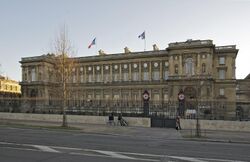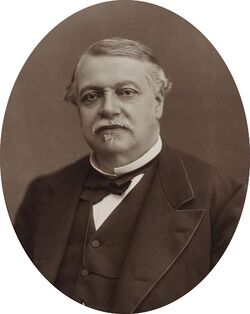Finance:Paris Monetary Conference (1878)
The International Monetary Conference was the second of a series of international monetary conferences, held at the Ministry of Foreign Affairs on Quai d'Orsay, Paris, from 10 to 29 August 1878.[1] It was chaired by French finance minister Léon Say.[2]:198
Overview
A great fall in the relative price of silver as measured in gold, in progress since 1873, had affected the relations of silver-using countries, and disturbed the level of prices. Producers of silver in the United States suffered, while the management of all double-standard currencies became a task of increasing difficulty.[3]:70
In 1878, the U.S. Bland–Allison Act called for an international conference to address the problem. The conference was assembled in Paris for the sake of convenience,[4]:204 in contrast to 1867 when the impulse came from the French authorities. It brought together Austria-Hungary, Belgium, France , Italy, the Netherlands, Russia, Sweden (jointly with Norway ), Switzerland , the United Kingdom as well as the United States, though not Germany.[2]:198 The conference agenda was to consider: first the desirability of retaining the unrestricted use of silver for coinage, and second the adoption of international bimetallism, by the acceptance of a ratio to be fixed by agreement.[5]
After somewhat protracted discussion and the presentation of a large number of documents, the European states accepted the United States' proposition "that it is necessary to maintain in the world the monetary functions of silver," but declined to bind the discretion of particular states as to the methods to be employed.[citation needed] They further declared it impossible to enter into an agreement for a common ratio. The conference, therefore, separated without any result being obtained.[6]
See also
Notes
- ↑ Conférence monétaire internationale de 1878: Procès verbaux. Paris: Imprimerie nationale. 1878. https://archive.org/stream/procsverbauxcon00frangoog#page/n11/mode/2up. Retrieved 11 June 2018.
- ↑ 2.0 2.1 Elisha Benjamin Andrews (June 1893), "The Monetary Conference of 1892", Political Science Quarterly (8:2): 197-219, https://www.jstor.org/stable/2139642
- ↑ Charles Kindleberger (1993). A Financial History of Western Europe (Second Edition). Oxford University Press.
- ↑ Henry B. Russell (1898), International Monetary Conferences: Their Purposes, Character and Results, with a Study of the Conditions of Currency and Finance in Europe and America during Intervening Periods, and in their Relation to International Action, New York: Harper & Brothers, https://archive.org/stream/internationalmon00russuoft#page/n5/mode/2up
- ↑ "ICRP calendar of international relations in the 19th century". Institute for Cultural Relations Policy. http://culturalrelations.org/Resources/ICRP_Calendar-19th_century.pdf.
- ↑ Johannes Wiegand (March 2023), "Gold, Silver, and Monetary Stability", Finance & Development (International Monetary Fund), https://www.imf.org/en/Publications/fandd/issues/2023/03/gold-silver-monetary-stability-johannes-wiegand
 |



